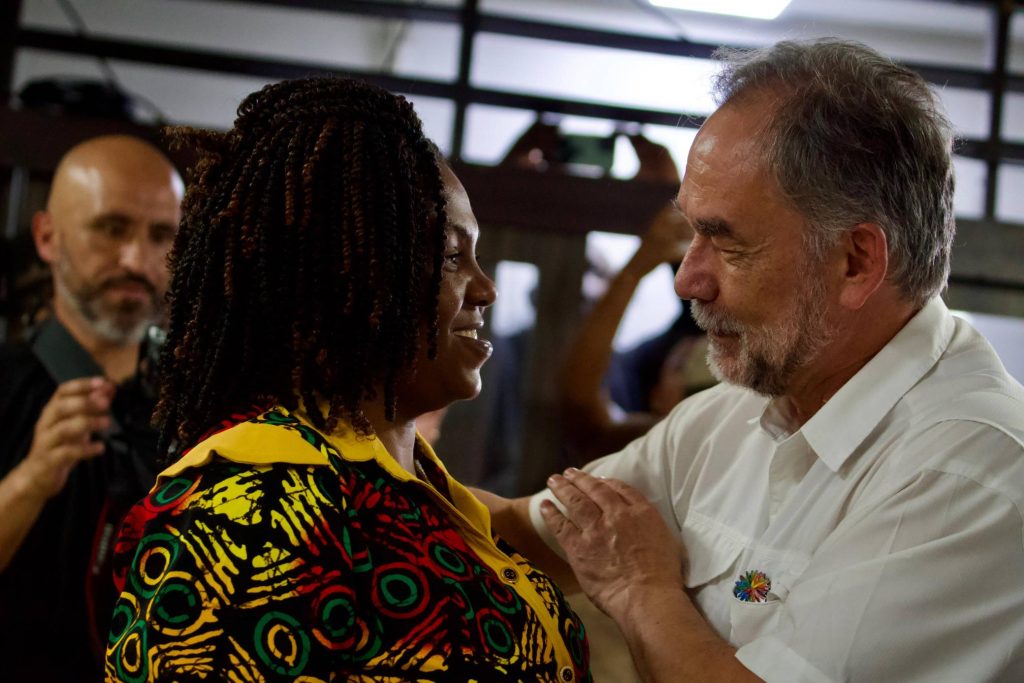Buenaventura (Valle del Cauca), October 5, 2024 – The Vice President and Minister of Equality and Equity, Francia Márquez Mina, led this Friday the closing day of the Second Pacific Regional Convergence Meeting COP16, in Buenaventura.
Since last Wednesday and for three days, work was carried out to define the roadmap for the region's participation in the Biodiversity Summit, to be held in Cali from October 21.
In recognition of the rich bioculturality of the Colombian Pacific and its importance for the global ecological balance, as well as the need to guarantee the sustainability of natural resources for present and future generations, diverse Pacific communities, civil society organizations, environmental leaders from Black, Afro, Raizal, Palenquero, Indigenous, Youth, Women, Peasant, Local, Urban, Diverse (LGTBIQ+), Community Action Boards, NGOs, academia and institutions, among other inhabitants of the territory, presented their contributions to biodiversity conservation.
During the Second Regional Convergence Meeting, led by the Vice President of the Republic and Minister of Equality, Francia Márquez, communities, local authorities and academia defined the roadmap for Pacific participation in the COP16.
These contributions seek to protect strategic ecosystems, promoting endogenous development from a productive perspective and a harmonious use of resources.
“Finding this space full of leaders from all over our Pacific region fills me with hope and joy, above all, to know that in the midst of the differences we agree on what is fundamental, which is to work together to move this region forward”, said the vice-president.
In the same sense, Mauricio Cabrera, Vice Minister of Environmental Policy and Standardization of the Ministry of the Environment, emphasized that this meeting was key to building on Colombia's Biodiversity Action Plan and the importance of convergence among all sectors to halt the loss of biodiversity and strengthen its sustainable use. “It was an event where we listened to the entire population, we listened to the needs they have in their territory and how we can integrate them into these structural bets that will be discussed at COP16” he said.
They also proposed the development of actions to de-escalate the armed conflict in the Pacific Environmental Region, through mechanisms such as social investment, decentralization and increased institutional presence in the territories, and protection of environmental and social leaders.
“It is not possible to talk about biodiversity if our people do not have dignity or live in peace. My main message is that this Pacific continues to desire peace. I urge all of us who have responsibilities to ensure dignity and life to work together to restore peace to this region", Márquez Mina added.

“We must show the culture of the Pacific, its biodiversity and its enormous potential. I believe that COP16 will be a success if we all continue to work together going forward": Vice President Francia Márquez.
Governance from the territories, a commitment of Francia Márquez for COP16
The strategic objectives were also presented at the meeting, which include strengthening territorial governance by promoting the active participation of communities in decision-making and ensuring land tenure; promoting sustainable development based on nature through productive activities that respect ecosystems; conserving biodiversity through actions that protect and restore marine, coastal and terrestrial ecosystems ; strengthening research and innovation by promoting scientific research and the application of appropriate technologies; promoting environmental education by integrating it into all levels of education; and integrating territories through regional environmental connectivity strategies.
The governor of Cauca, Jorge Octavio Guzmán, highlighted the importance of this meeting, which allows the articulation of efforts in the region. “How good that we could consolidate an action plan for the conservation and recovery of biodiversity in our Pacific region among the four departments,” he said.
For his part, the governor of Valle del Cauca, Dilian Francisca Toro, did not hide his joy at the realization of COP16 in the region. “Here in the Pacific, we are going to live it, we are going to feel it, we are going to be able to express it to all the people who come here and that will give visibility to our region and to the Colombian Pacific. COP16 does not belong to just one place, it belongs to the whole region”, she said.
The meeting also discussed the creation of a public policy fund that will include resources from the Vice Presidency, the Ministry of Foreign Affairs, the Ministry of Environment and Sustainable Development, with support from CAF.
The governor of Chocó, Nubia Carolina Córdoba, made the same point: “We, the Pacific, cannot miss the opportunity to make visible the fact that we are the biogeographic Chocó, one of the five mega-systems of biodiversity”.
While the governor of Nariño, Luis Alfonso Escobar, praised the riches of his territory. “Nariño is a country region for the world, because we are home to environmental conditions of nature that are of global importance for climate action and biodiversity conservation.”
The participation of the Pacific Region is fundamental to continue building the COP of the people, where the visions, experiences and perspectives of diverse actors are necessary in the conversation on biodiversity protection.
“We are going to be the hosts of a global meeting; we must also be the best. We must show that this Pacific is culture, is biodiversity and has enormous potential,” concluded Vice President Francia Márquez Mina.


